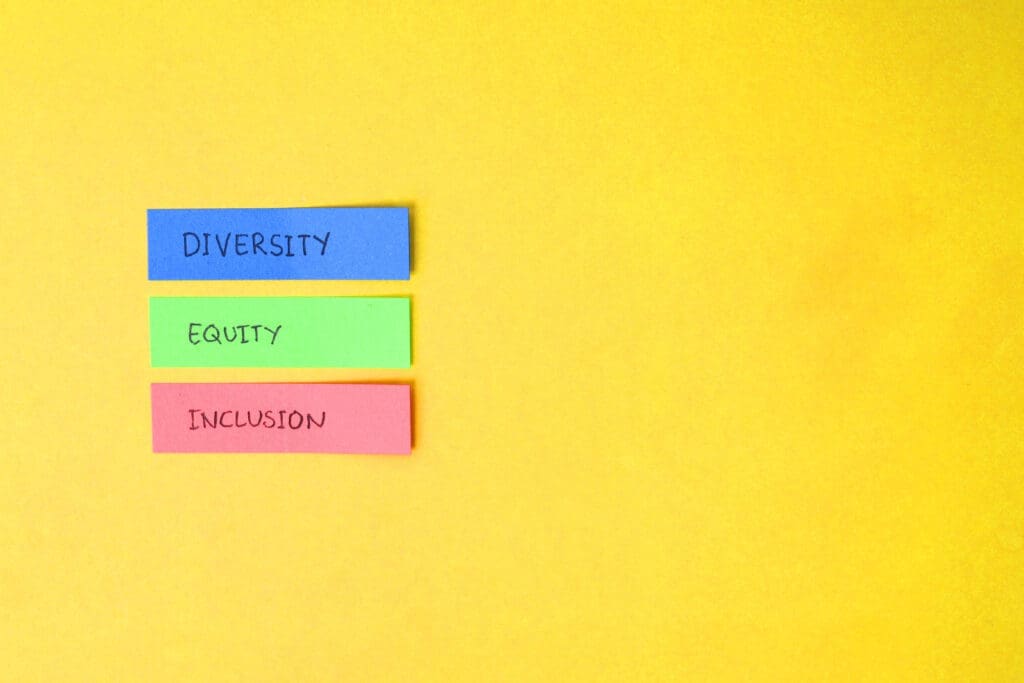Focusing on diversity, equity, and inclusion (DEI) in the workplace is more than just a trend. It’s crucial for employees’ satisfaction and the business’s overall success. Understanding how these factors affect employees’ performance sets the difference between a manager and a leader.
In a successful organization, people come to work feeling comfortable and confident, knowing they can be themselves and are sure of what is expected of them.
6 in 10 employees reported that their companies have policies to ensure fairness in the workplace meaning 40% of the US workforce doesn’t feel they’re treated properly or included.
So, why is diversity and inclusion in the workplace important, and what are the benefits?

Diversity, Equity & Inclusion in the Workplace
Diversity in the workplace refers to respecting what every employee brings to the company.
A diverse work environment provides equal opportunities and rights to all employees regardless of gender, sexual orientation, age, ethnicity, socioeconomic background, religious views, and physical abilities.
However, diversity doesn’t always equal inclusion. Some companies might focus on diversity but don’t include everyone. This means that different opinions, experiences, ideas, and perspectives aren’t given the same weight. Only an inclusive environment will be able to benefit from diversity.
Equity in the workplace means that all employees have equal access to learning and training opportunities, promotions, and resources. They’re all evaluated according to their skills, knowledge, and performance rather than individual traits and characteristics.
Despite the importance of these factors, many businesses still have to work on ensuring that their companies focus on workplace equality. For example, one study showed that LGBTQ+ workers earn about 90% of what a typical worker makes.
Following DEI practices ensures the creation of a workplace free of discrimination and harassment. Unfortunately, 61% of US employees reported witnessing or being the subject of workplace discrimination and harassment related to age, gender, country of origin, race, and religion
Benefits of a Diverse and Inclusive Workplace
As a manager, you should understand why diversity and inclusion are important in the workplace. Here are some of their benefits.
Trust
The lack of diversity in the workplace can cause communication issues. People might not seek guidance from mentors or feel intimidated when asked to speak their opinions.
A diverse and inclusive environment establishes a sense of belonging. Employees feel more connected and motivated, as they trust that they’ll be evaluated solely based on their performance.
People tend to trust those who share common traits, so they naturally look for similarities. Apparent differences can lead to an initial lack of trust unless the company ensures that inclusion practices guide all business operations.
People learn to trust their colleagues and bosses by verifying their acceptance, openness, straightforwardness, and reliability. All diversity, equity, and inclusion issues should be addressed and not ignored or taken lightly.
Creativity
Limited diversity and inclusion will negatively affect the company’s access to talent. When all people working on one project or task come from the same background, they become at risk of developing groupthink.
A recent study showed that diverse companies have a 73% higher percentage of attracting top talents, which answers the question: why is diversity important in the workplace?
Every person sees the world from a different angle, and when you have a diverse team, you get a larger pool of talents working towards a shared goal. People with different upbringings, background knowledge, and life experiences can provide valuable input to the company’s business operations.
Reputation
The importance of diversity and inclusion is becoming more prominent, as more GenZ employees consider it a crucial factor in choosing the company they work for compared to millennials.
Knowing that employees won’t be judged for anything but their skills and performance solidifies the organization’s image as a fair work environment where everyone is given equal rights.
With studies showing that diverse and inclusive companies get 2.3 times more cash flow per employee, more people will be keen to work for such organizations.
Employee Satisfaction & Retention
Due to all the previous factors, diverse, equal, and inclusive work environments make people feel happy with what they do. Work-related stress becomes more bearable as people know they’ll be recognized for their efforts.
Diversity, equity, and inclusion create a positive work environment and improve employee engagement. People can be themselves and openly share their opinions without fearing being judged, made fun of, or punished.
DEI Challenges in the Workplace
Despite the importance of following DEI practices, managers sometimes don’t apply them as they should. Here are some reasons why this happens.
Not Knowing What to Measure
Managers are often challenged by determining which metrics to measure to identify how DEI practices are followed. A mix of qualitative and quantitative data should be considered, and the metrics used should be relevant to the company and its employees.
Quantitative data can show the improvement in business performance with the number of diverse hires and frequency of absenteeism. Other tools include a reduction of discrimination complaints, a lower rate of turnover, and a higher level of production, creativity, and innovation.
Managers can access these numbers from regular business reports provided by middle management or HR professionals.
Quantitative data measure employee satisfaction and engagement, changes in attitude, and how comfortably workers share their opinions. Surveys, open discussions, and one-to-one meetings can help reveal this information.
Limited Budget and Inexperienced Staff
Employing DEI measures requires educating your employees about the definition of these concepts and how they can be implemented in the workplace. This is done through regular training, workshops, and seminars.
Unfortunately, companies might not have access to the financial resources required to support these practices. They can also have no budget to start a DEI team that enforces these practices and supervises how they’re put into action.
With a lack of an inexperienced staff, these words can be easily misunderstood. For example, a diverse workplace that focuses on hiring people from different cultural backgrounds might not be inclusive. At the same time, these people might not be given equal opportunities.
Focusing on DEI should be linked to the company’s mission and goals. In 2023, some major companies like Tesla, Home Depot, and Meta decided to cut down the budget dedicated to DEI teams and reduced the number of these officers by almost 50%. Due to fluctuating profits during and after the pandemic, these organizations decided to shift to hiring consultants instead of full-time employees to address DEI issues in the workplace.
Resistance to Change
Some employees and managers might resist a DEI program. It could happen because of misinterpreting or misunderstanding the goals of the program.
People might resist changes they’re not familiar with. They might not realize how unfair the work environment is unless they’ve been personally impacted by discrimination and harassment. The lack of communication and budget needed to promote DEI programs are the culprits.
Managers should spend time educating people about the actual goals of such practices and how they can benefit the company as a whole. At the same time, they should address fears or concerns employees might have regarding DEI.
Lack of Leadership Support
Without top management commitment to and support of DEI, these practices won’t be successful. Focusing on diversity, equity, and inclusion shouldn’t be a temporary measure taken to address a recent incident, but rather a new policy.
Top managers should prioritize DEI issues and communicate their importance to middle management. Focusing on following these practices should be a crucial part of the decision-making process. Managers and heads of departments should also lead by example by practicing active listening and engaging in open discussions.

How to Ensure a Diverse and Inclusive Workplace
Here are four ways to improve diversity, equity, and inclusion in your company.
- Ensure You Have an Inclusive Workplace Model
Instead of focusing on numbers, see how your diversity and inclusion practices affect your employees. For example, talking about supporting new mothers returning to the workplace doesn’t matter without a private area where they can comfortably pump their breast milk.
Creating an inclusive culture where everyone feels comfortable and valued is essential. As a manager, you should acknowledge the differences existing in your company and encourage a workplace that caters to all individual needs.
- Acknowledge and Respect all Cultural and Religious Practices
Due to the lack of knowledge, some people might unknowingly offend others by not acknowledging their cultural and religious practices.
Talking about DEI to your employees won’t mean much if you schedule back-to-back meetings, denying Muslim employees a chance to pray. Your Jewish employees might not be able to have a snack if you don’t dedicate a fridge for Kosher food, for example.
Consider offering floating holidays, ensuring everyone is comfortable having a drink during a company outing, and scheduling events around religious occasions. These practices make your workplace more inclusive and help employees feel more valued.
- Discuss Discrimination Issues
A diverse and inclusive workplace is built on trust and transparency. As a result, it’s crucial to tackle sensitive issues like the gender pay gap, sexual harassment, and homophobia.
Acknowledge these issues and communicate how the company will address them. For example, a manager could hold a meeting to discuss how the company will work towards eliminating a pay gap.
The company can also create a manual about workplace-acceptable social behavior, including using gender-neutral language and avoiding transphobic and homophobic jokes and slurs.
- Get Feedback
After implementing DEI policies, it’s essential to see how well they’re performing. This is done through honest feedback received from employees.
To get your employees’ feedback, they should understand that their opinions matter. Their insights should be turned into action, and you should give them credit.
Use surveys, one-to-one meetings, and stay and exit interviews, and encourage people to send anonymous messages if they’re uncomfortable sharing their opinions. The goal is to see how your practices are making your workplace more diverse, equal, and inclusive of everyone.
TL;DR
- Defining diversity, equity, and inclusion is crucial for a company’s success.
- Diversity doesn’t necessarily ensure inclusion, as these two terms refer to different practices.
- Despite the importance of DEI, many employees still fall victim to workplace discrimination and harassment.
- Following DEI practices increases the trust in the company. It also improves its access to talent, reputation, and employee engagement and retention.
- Managers deal with several challenges while trying to implement DEI, like lack of resources and resistance to change.
- Ensuring inclusion, respecting cultural and religious differences, and discussing harassment and discrimination incidents will improve diversity, equity, and inclusion in the workplace.




